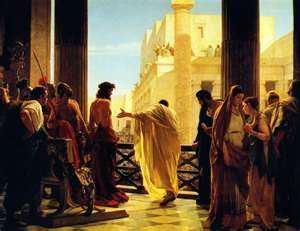What is gained by having this prisoner exchange highlighted, seeing that Barabbas appears in all 3 Synoptic gospels? Jesus can fulfill all of what was predicted regarding his death and atonement for sins without this detail; without having a murderer released instead of him right before he himself is killed on the cross. Why did it happen and why is it in the gospels?
Upon asking that question, it’s virtually impossible to miss the substitution theme in this passage. Barabbas, or the son of the father, who was guilty of murder was released instead of Jesus, the son of Almighty Father, who was completely innocent. In essence, Jesus took his place, in that because Jesus was to be killed, Barabbas was freed. In this way Barabbas represents us—guilty, despicable sinners who are deserving of punishment. However, because Christ was punished instead of him, he also represents all those who would ever believe upon Christ; he represents all those who will be in heaven eternally worshipping the Lamb who was slain. This securing of the salvation of innumerable sinners puts forth the purity, and worthiness of the God-man.
In light of this truth, How must God view it when we try to add our own righteousness to Christ’s righteousness?–“Look at my consistent Bible reading Lord; am I accepted before you now? I’ve been praying more and I even helped my neighbor carry something from their car. Besides that, I had a couple spiritual conversations with people during this past month. Surely now I am righteous in your eyes!” That is the equivalent to Barabbas thinking that he was released because of something in himself, which is defaming to Christ. So, God’s response to that thinking could be something like this: “In the giving of my Beloved Son on your behalf, it’s as if I have transferred to your account all of the currency ever printed in the United States, but you are trying to increase your balance by adding some old, used recycled napkins to your account.” To prevent that atrocity, we must continue to comprehend our sin that led to the necessity of Christ’s substitution and trust in an imputed righteousness granted to all those who entrust themselves to the Lamb.

